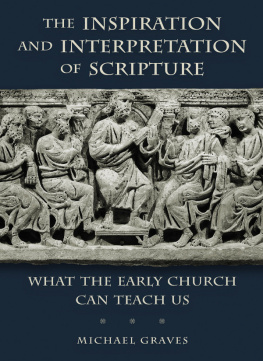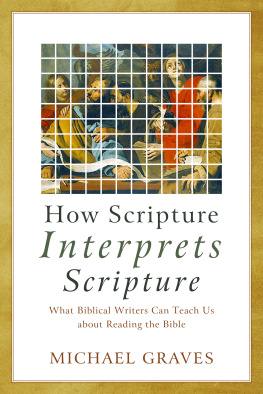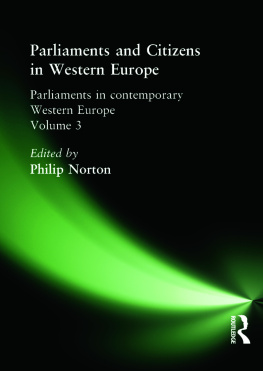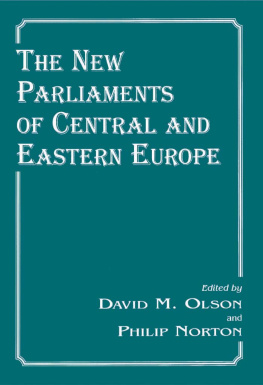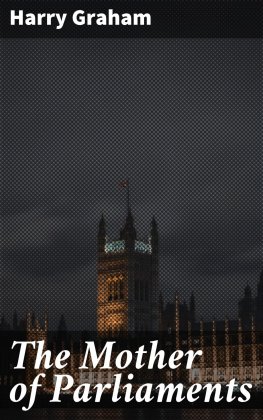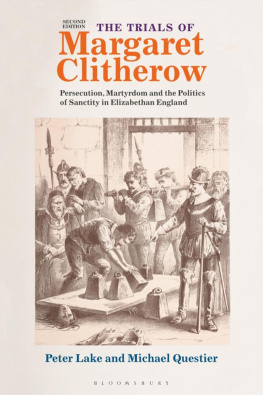ELIZABETHAN PARLIAMENTS 15591601
Elizabethan Parliaments 15591601
SECOND EDITION
MICHAEL A. R. GRAVES
First published 1987 by Pearson Education Limited
Second edition 1996
Published 2013 by Routledge
2 Park Square, Milton Park, Abingdon, Oxon OX14 4RN
711 Third Avenue, New York, NY 10017, USA
Routledge is an imprint of the Taylor & Francis Group, an informa business
Copyright 1987, 1996 Taylor & Francis.
The right of Michael A. R. Graves to be identified as author of this work has been asserted by him in accordance with the Copyright, Designs and Patents Act 1988.
All rights reserved. No part of this book may be reprinted or reproduced or utilised in any form or by any electronic, mechanical, or other means, now known or hereafter invented, including photocopying and recording, or in any information storage or retrieval system, without permission in writing from the publishers.
Notices
Knowledge and best practice in this field are constantly changing. As new research and experience broaden our understanding, changes in research methods, professional practices, or medical treatment may become necessary.
Practitioners and researchers must always rely on their own experience and knowledge in evaluating and using any information, methods, compounds, or experiments described herein. In using such information or methods they should be mindful of their own safety and the safety of others, including parties for whom they have a professional responsibility.
To the fullest extent of the law, neither the Publisher nor the authors, contributors, or editors, assume any liability for any injury and/or damage to persons or property as a matter of products liability, negligence or otherwise, or from any use or operation of any methods, products, instructions, or ideas contained in the material herein.
ISBN 13: 978-0-582-29196-6 (pbk)
British Library Cataloguing in Publication Data
A catalogue record for this book is available from the British Library
Library of Congress Cataloging-in-Publication Data
Graves, Michael A. R.
Elizabethan parliaments, 15591601 / Michael A.R. Graves. -- 2nd ed.
p. cm. -- (Seminar studies in history)
Includes bibliographical references and index.
ISBN 0-582-29196-8
1. Great Britain. Parliament--History--16th century. 2. Great Britain--Politics and government--15581603. I. Title. II. Series
JN525.G73 1996
328.4209031--dc20 | 96-10366 |
CIP |
CONTENTS
Such is the pace of historical enquiry in the modern world that there is an ever-widening gap between the specialist article or monograph, incorporating the results of current-research, and general surveys, which inevitably become out of date. Seminar Studies in History are designed to bridge this gap. The books are written by experts in their field who are not only familiar with the latest research but have often contributed to it. They are frequently revised, in order to take account of new information and interpretations. They provide a selection of documents to illustrate major themes and provoke discussion, and also a guide to further reading. Their aim is to clarify complex issues without over-simplifying them, and to stimulate readers into deepening their knowledge and understanding of major themes and topics.
ROGER LOCKYER
Readers should note that numbers in square brackets [] refers readers to the corresponding item in the Documents section which follows the main text.
The publishers would like to thank the following for permission to reproduce copyright material: Cambridge University Press for several extracts from De Republica Anglorum, by Sir Thomas Smith, edited by M. Dewar, 1982; an extract from Proceedings in the Parliaments of Elizabeth I, by T.E. Hartley, 1981 by permission of Leicester University Press (a Cassell imprint), London. All rights reserved; Her Majestys Stationery Office for an extract from The Journal of Commons Proceedings, 1572, by Fulk Onslow, The Historical Manuscripts Commission Reports, The Manuscripts of the House of Lords, Vol. xi, addenda 15141714.

When Henry Tudor became King of England in 1485 representative assemblies existed in France, the various Spanish kingdoms, the Holy Roman Empire, the Low Countries, Sicily and Poland, indeed in most European countries. They varied in age some being older than the English parliaments in authority and in the frequency of their meetings. However, they had one common characteristic. Their structure reflected the formal division of society into three estates of clergy, nobility and the rest. In practice, parliamentary power, especially the power to resist the monarchs financial demands, was usually confined to the first two estates, whilst, in some cases, representation of the third estate had become restricted to the towns. Nevertheless, most continental assemblies consisted of competing social orders which sat apart and deliberated separately. English parliaments, however, evolved in a quite different way. They had begun as meetings of the King and his professional counsel with his great council of spiritual and temporal magnates, in order to treat of important matters of government. As such, they embodied a basic medieval principle of government by consent of the community and they expressed a sense of unity and consensus. Sometimes, therefore, parliaments included shire (county) and borough (town) representatives, whose prime function was to grant taxes in response to royal requests. Thus far, Parliament was a unicameral institution in which the various social orders sat together. Although, in the early days, the knights of the shire (the county members) and the burgesses (the borough representatives) often went home once they had assented to new taxes, early English parliaments did not follow the continental model and sit as separate estates.
Then, in Edward IIIs reign, parliamentary developments destroyed any resemblance to other European assemblies, even if the concept of a society organised into estates lingered on in the minds of many men. Representatives of the lower clergy disappeared from Parliament and instead attended the Convocations (assemblies) of the Church. The knights and burgesses too began to sit apart from the bishops and abbots (the lords spiritual) and the nobles (lords temporal). However, the process of fragmentation stopped there. The lords spiritual and temporal did not divide into separate parliamentary estates. Instead, they, together with the Kings professional counsel his judges, attorney, solicitor and his Serjeants (eminent lawyers) - continued to sit in the original Parliament House. It was not until well into the sixteenth century that they became known as the House of Lords. Nevertheless, long before Henry VIIs reign Parliament had developed into a bicameral institution. Structurally, it bore little similarity to the continental concept of estates, even though it was common to refer to the lords spiritual and temporal and the commons as three estates.
This development was accompanied and followed by changes, not only in Parliament as an entity, but also in its component parts. Before the accession of the first Tudor in 1485 there had probably developed known procedures for the transaction of business, even if they were, as yet, flexibly applied. Surviving documentary fragments from the mid-fifteenth century show that clerks, in the Upper House at least, were keeping records of proceedings. The functions of parliaments, too, were altering and, at the same time, becoming more clearly defined. Consultation between the King and the wealthier, more powerful and influential subjects and communities in the realm continued to be crucial to good governance. And the parliament time was the most convenient occasion for the exchange of views. However, parliaments had shed their earlier curial (judicial) character. Despite continued references to the High Court of Parliament, they had become, first and foremost, taxing and legislative assemblies. Henry VIIs parliaments did not simply declare what the law was, as a judge or law court might do; they enacted new laws on a wide range of subjects.





